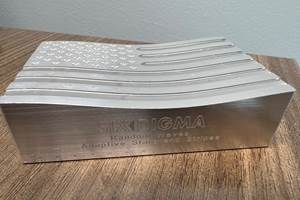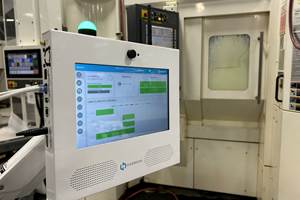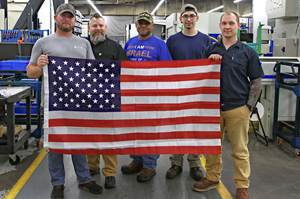Teaching With Technology
A North Carolina machining instructor says the industry should give community colleges a second look.
Share




Isothermal Community College (Spindale, North Carolina) is combating the metalworking industry’s skilled labor shortage one student at a time. It is also helping to alter young people’s misperceptions about manufacturing and improve the industry’s view of community colleges.
The school is accomplishing all of this by being a “leader in technology,” in the words of machining technology instructor Scott Bradey. “We aren’t teaching behind the times,” he says.
Aiding Isothermal in this endeavor is a recent $216,500 grant from Duke Power (Charlotte, North Carolina), a business unit of Duke Electric. The company’s Community and Technical College Grant Program rewards schools that provide training for manufacturing and related industries in the Carolinas.
Mr. Bradey, who has more than 25 years of machining experience and has taught at Isothermal for more than 9 years, says the grant has allowed the school to purchase three new Haas milling machines and two Haas lathes. These are being incorporated with the school’s existing stable of machines—two Fadal vertical milling machines; two Fanuc-controlled Hardinge turning centers; two Haas turning centers and two Bridgeport milling machines—to help the school train students more effectively.
Leaving The Past Behind
Isothermal made the commitment to providing sophisticated equipment on which to train its students long ago. In keeping with that commitment, the school recently spent $100,000 of its own money in addition to the funds from the grant to purchase modern equipment.
However, things at Isothermal weren’t always so advanced. “In the past, we always had to play catch-up,” Mr. Bradey says. “We’d get machines donated, but they were basically antiques, and you couldn’t teach the more advanced work.”
Recognizing this, Isothermal changed. Other community colleges have changed, too. However, Mr. Bradey thinks that many in the industry still perceive community colleges as not being up to speed. That view itself is antiquated in the case of schools such as Isothermal.
“I think the industry needs to give community colleges a second look,” he states. “A lot of schools are really improving and modernizing. I think there’s a lack of awareness of how well community colleges can serve the industry.”
He also believes that many of his potential students have an out-of-date impression of the industry itself.
“I think a lot of young people have seen the old shops that aren’t modernized, and they think of them as looking like garages,” says Mr. Bradey. He says they don’t realize how essential a clean and well organized facility can be for the high-value work that many manufacturers do today.
On the other hand, the garage impression can also offer a certain mystique. He says he expects to see some improvement in students’ interest in the near future, as popular culture, in the form of shows such as “Orange County Choppers,” gives young people a more positive sense of what machinists actually do and make.
Moving Forward
With the advancements in technology come new challenges that Isothermal must meet. One is that the cost of educating students is much higher than it was in the past.
As an example, Mr. Bradey points to tooling. Although a local Valenite representative has helped him to adopt modern indexable carbide tools, the change still represents an increase in cost. “In the past, I could get a $3 end mill, so if a student burnt it up, it wasn’t a big deal,” he says. “Now, an end mill with inserts is $100.”
Students must also be trained at a higher level in order to keep up with the new technology. At Isothermal, students are first trained on manual machines, then they move on to CNC machines. They begin with basic projects and move on to more advanced assignments, such as a recent one in which students made a complete sniper rifle. Mr. Bradey says the school is beginning to integrate the National Institute for Metalworking Skills (NIMS) testing program into its curriculum.
In Mr. Bradey’s view, the best CNC operators of the next generation will be hands-on machinists, but with a different range of skills than what we’ve associated with machinists in the past.
“More is being put on operators today; they have to run more machines, so they have to be more skilled,” Mr. Bradey says. He and his department hope not only to raise skill levels, but also to give future employees the understanding that they need to be immediately productive in today’s high-tech manufacturing environments.
Related Content
How to Pass the Job Interview as an Employer
Job interviews are a two-way street. Follow these tips to make a good impression on your potential future workforce.
Read MoreBuilding Machines and Apprenticeships In-House: 5-Axis Live
Universal machines were the main draw of Grob’s 5-Axis Live — though the company’s apprenticeship and support proved equally impressive.
Read MoreCan Connecting ERP to Machine Tool Monitoring Address the Workforce Challenge?
It can if RFID tags are added. Here is how this startup sees a local Internet of Things aiding CNC machine shops.
Read MoreFinding Skilled Labor Through Partnerships and Benefits
To combat the skilled labor shortage, this Top Shops honoree turned to partnerships and unique benefits to attract talented workers.
Read MoreRead Next
5 Rules of Thumb for Buying CNC Machine Tools
Use these tips to carefully plan your machine tool purchases and to avoid regretting your decision later.
Read MoreSetting Up the Building Blocks for a Digital Factory
Woodward Inc. spent over a year developing an API to connect machines to its digital factory. Caron Engineering’s MiConnect has cut most of this process while also granting the shop greater access to machine information.
Read MoreBuilding Out a Foundation for Student Machinists
Autodesk and Haas have teamed up to produce an introductory course for students that covers the basics of CAD, CAM and CNC while providing them with a portfolio part.
Read More


































